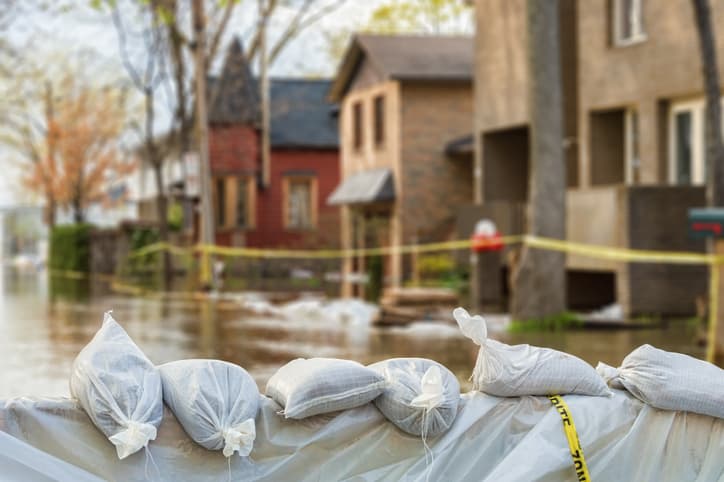Is My Home In A Flood Risk Area?
Plan, Prepare, Protect

There are a number of ways in which your home could be flooded, whether due to accidents that occur inside the home, such as a burst pipe or a leaking washing machine, or by external sources, such as a river bursting its banks. No matter what the cause, water can create serious damage to your home and belongings, so knowing whether you’re in a flood risk area could help you to make some preparations just in case anything should happen. You may even be put off purchasing a property altogether if it’s flagged as being in a high-risk area and your home insurance could be more expensive because of it.
Below, you can find out useful information around how to check the flood risk of your current home or a potential new home and when a flood risk assessment may be required.
How to check for flood risk
To find out whether your home is at risk of flooding and the likelihood of that risk (low, medium, high), you should do some research into whether the property has flooded in the past.
The first step is to check out the Flood Maps website from the Commissioners of Public Works in Ireland. Simply zoom into the area you want to check and use the toggles in the sidebar to check the probability of the area flooding in the future. You can select low, medium or high risk of flooding from a river, or low, medium or high risk of flooding near the coast.
Local knowledge can be very helpful and it might be worth speaking to neighbours who may have lived in the area for a long time and can provide additional information about the history of the property and any incidents. You may also want to look into the location of the nearest water sources, such as rivers, canals, lakes, etc., that could be a potential cause of flooding.
With global warming, we may expect to see more extreme weather events in the future. And with that, it is worth considering that homes can be flooded even if they have never flooded before.
If you wish to understand the risk of your home flooding in detail, you could hire a search provider to create a property report. This can be done when purchasing a new home or a report can be created on your current home. While they will not look at your home itself, they will be able to map drainage systems and local water sources that could pose a problem and more. When the report is complete, you will be sent a copy so you can put correct precautions in place should they be needed.
When is a flood risk assessment required?
A flood risk assessment (FRA) may be required for property developers who plan to build new houses and, in some cases, for homeowners who plan to extend their home. Homeowners generally don’t need one unless you are asked for one as part of your planning application, but they are much more common for large developments, such as new housing estates. The land needs to be checked to assess the extent of the risk, what land could be affected and the impact it could have on the development. In some cases, a new development could have a knock-on effect and cause flooding elsewhere due to surface water run-off. In this instance, the development may not be allowed to go ahead at all unless a solution is reached. Alternatively, a justification is required that states why the development should be able to go ahead despite being in a risky area.
If your home is already considered to be in a flood-risk area, then it’s likely that you will require an FRA to ensure that any extensions are safe to be built on the land. However, if your home is not currently at risk of flooding, then it’s not likely that the extension will be either.
Is my home still at risk of flooding if I am based in a high-lying area away from rivers/lakes?
The simple answer is yes. During a prolonged and heavy downpour, rainwater can build up around houses where the ground has become saturated with drains and sewers blocking up. This can happen in urban areas where the ground consists of mainly hard surfaces and the rainwater doesn’t soak into the ground.
Is flooding covered by home insurance?
Different home policies will have different levels of cover so it is important that you ask if your home is covered for flood damage under your policy. It may be difficult to get flood cover if you are based in a high risk area which has flooded regularly in the past.
If your home insurance policy covers for flood events, you should ensure that the building and its contents are insurerd for the correct amount, including any outbuildings, such as garages and sheds. Should a flood occur, you will want any valuables in these outbuildings to be covered too.
It’s worth noting that damage caused by storms are usually covered in your standard home insurance policy and flood risk is viewed separately.
